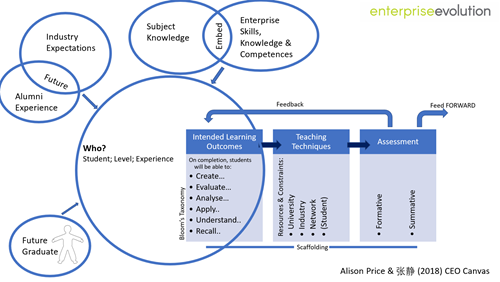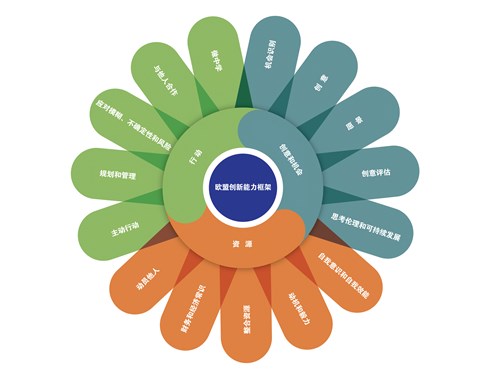Group Size
?
1.) Small group (teams of 4-6)
2.) Individual Task
3.) Large Group
4.) Any
Small group (teams of 4-6)
Learning Environment
?
1.) Lecture Theatre
2.) Presentation Space
3.) Carousel Tables (small working group)
4.) Any
5.) Outside
6.) Special
Carousel Tables (small working group)
QAA Enterprise Theme(s)
?
1.) Creativity and Innovation
2.) Opportunity recognition, creation and evaluation
3.) Decision making supported by critical analysis and judgement
4.) Implementation of ideas through leadership and management
5.) Reflection and Action
6.) Interpersonal Skills
7.) Communication and Strategy
1Creativity and Innovation
2Opportunity recognition‚ creation and evaluation
3Decision making supported by critical analysis and judgement
4Implementation of ideas through leadership and management
5Reflection and Action
6Interpersonal Skills
7Communication and Strategy
The CEO programme is a staff development programme offered in China as a two-day intensive workshop. Built upon a philosophy of “learning by doing” and high levels of staff/delegate engagement, this programme seeks to move staff from the traditional teaching approaches which are prevalent in China to incorporating Entrecomp (2018) as a way to incorporate enterprise as well as the concept of constructive alignment (Biggs) in curriculum design. This approach has been specifically created to address the needs of Chinese educators in creating entrepreneurial outcomes for their learners. At the end of the CEO programme, the delegates (teachers in any subject areas) will be able to Explain the need, context and rationale for enterprise education Identify appropriate methods to embed enterprise education into your teaching Formulate (create) your own approach embedding enterprise education
The CEO Programme was co-created by Alison Price Enterprise Evolution UK and Zhang Jing in Enterprise Evolution China, which is the first Sino-UK designed staff development programme across China (over 300+ delegates so far). The focus is threefold a) to change teachers’ mindset and raise awareness b) help them embed enterprise in their curriculum design and delivery so that they can create entrepreneurial graduates who are able to cope with uncertainty, ambiguity and risks in the future and c) provide them with the tools to create change in the classroom/with their own approaches. Activity case: The programme is delivered in a 2-day workshop style. Each theme/technique follows a philosophy of learning by doing and is built upon four equally important stages, i.e. explain, experience, reflect and apply. Programme outline is as follows:
The CEO diagram guides the process of curriculum design (see attached) through a user/student centred curriculum development process. The CEO diagram is presented as a “canvas” for the delegates to develop their thinking with. Typically, they can work in groups to develop this, but often find that individual notes are useful to progress this thinking after the programme.

The process unfolds by:
1. Identifying the needs of the future graduate: drawing together staff aspirations, sector or (inter)national needs with institutional outcomes (stated graduate outcomes) can create an overview of the intended outcome (impact) of any programme. By opening up the thinking to address changing environmental (PEST) and institutional or subject needs, the student and their future needs is placed at the core of any curriculum change.
2. Sector needs: drawing upon sector/industry changes and alumni advice and guidance can illuminate changes that need to be addressed in delivery or skill development. This intel may be drawn from staff, national reporting or sector evidence, as well as programme/module feedback/alumni comment
3. Subject knowledge/Enterprise competences: staff are invited to focus on their traditional “input” view of teaching (knowledge they wish to impact) but now in conjunction with their understanding of enterprise (definition; Entrecomp competences) Together these elements create an understanding of who the student is – their needs and industry requirements.
This creates a basis for planning new curriculum that is rooted within the traditional Chinese approach of knowledge exchange, but now includes an appreciation of preparing students for their futures and supporting this through the clear development of enterprise competences (Entrecomp 2018). These stages are delivered in an interactive workshop style that builds delegates understanding whilst demonstrating a range of teaching techniques such as use of post-its, drawing, small group discussion, research and presentation.

This showcases how Entrecomp competences can be taught, whilst creating knowledge driven outcomes. The next process within the CEO diagram is to work through Biggs Constructive Alignment, incorporating understanding of student development needs (scaffolding) and feedback (feedforward) required. The delegates are then invited to use this process to create a new module, drawing upon the menu of teaching techniques that they have been exposed to during the programme, in order to present their new approach for peer review. Delegates are able to engage with this scaffolded approach and build their own skills and confidence to move from a traditional “guru” based teaching style to a more collaborative, student focused (facilitated) approach to teaching. Delegates also invited to take this process away and use with colleagues, leading them to create curriculum change.
Since the launch of the programme in July 2017, more than 300 delegates have been trained and feedback has been extremely positive, with 98% of delegates who responded to the CEO evaluation, saying that they would like to recommend the programme to others; Those who attended the programme have already reported significant changes in their own practice and received recognition, such as a
• delegate from Polytechnic University delegate who attended the programme in December 2017 created his own approach built around the acronym “IPAD” which won him a provincial teaching award;
• Nankai University delegate who attended the programme in November 2017 created significant change for which they won a university award in May 2019;
• At the time of writing, a delegate from Shougang Institute of Technology has been shortlisted for Beijing Municipal Teaching Competition.
The outcomes for staff range from building knowledge and understanding through to creating change in their own practice, as the CEO programme takes them through the following key areas to consider the impact (outcome) for their approach to teaching.
Zhang, J., Price, A. Developing the enterprise educators’ mindset to change the teaching methodology: the case of Creating Entrepreneurial Outcomes (CEO) Programme. Entrep Educ 3, 339–361 (2020). https://doi.org/10.1007/s41959-020-00037-1 https://link.springer.com/article/10.1007/s41959-020-00037-1
and
Bacigalupo, M., Kampylis, P., Punie, Y., Van den Brande, G. (2016). EntreComp: The Entrepreneurship Competence Framework. Publication Office of the European Union; Luxembourg, EUR 27939 http://publications.jrc.ec.europa.eu/repository/bitstream/JRC101581/lfna27939enn.pdf
Gibb,A and Price, A (Published: 2nd Edition, 2014; first published in 2007) A Compendium of Pedagogies for Teaching Entrepreneurship http://ncee.org.uk/wp-content/uploads/2018/01/Compendium-of-Pedagogies.pdf
Quality Assurance Agency (2012)Enterprise and entrepreneurship education: guidance for UK higher education providers. (Version 1) QAA (2018) Enterprise and Entrepreneurship Education: Guidance for UK Higher Education Providers http://www.qaa.ac.uk/docs/qaas/enhancement-and-development/enterprise-and-entrpreneurship-education-2018.pdf?sfvrsn=15f1f981_8 McCallum, Weicht, McMullan and Price (2018) “EntreComp into Action - Get inspired, make it happen: A user guide to the European Entrepreneurship Competence Framework” (Editors: Bacigalupo, M and O’Keefe, W) http://publications.jrc.ec.europa.eu/repository/handle/JRC109128
More details: http://enterpriseevolution.org.uk/work-in-china-4/